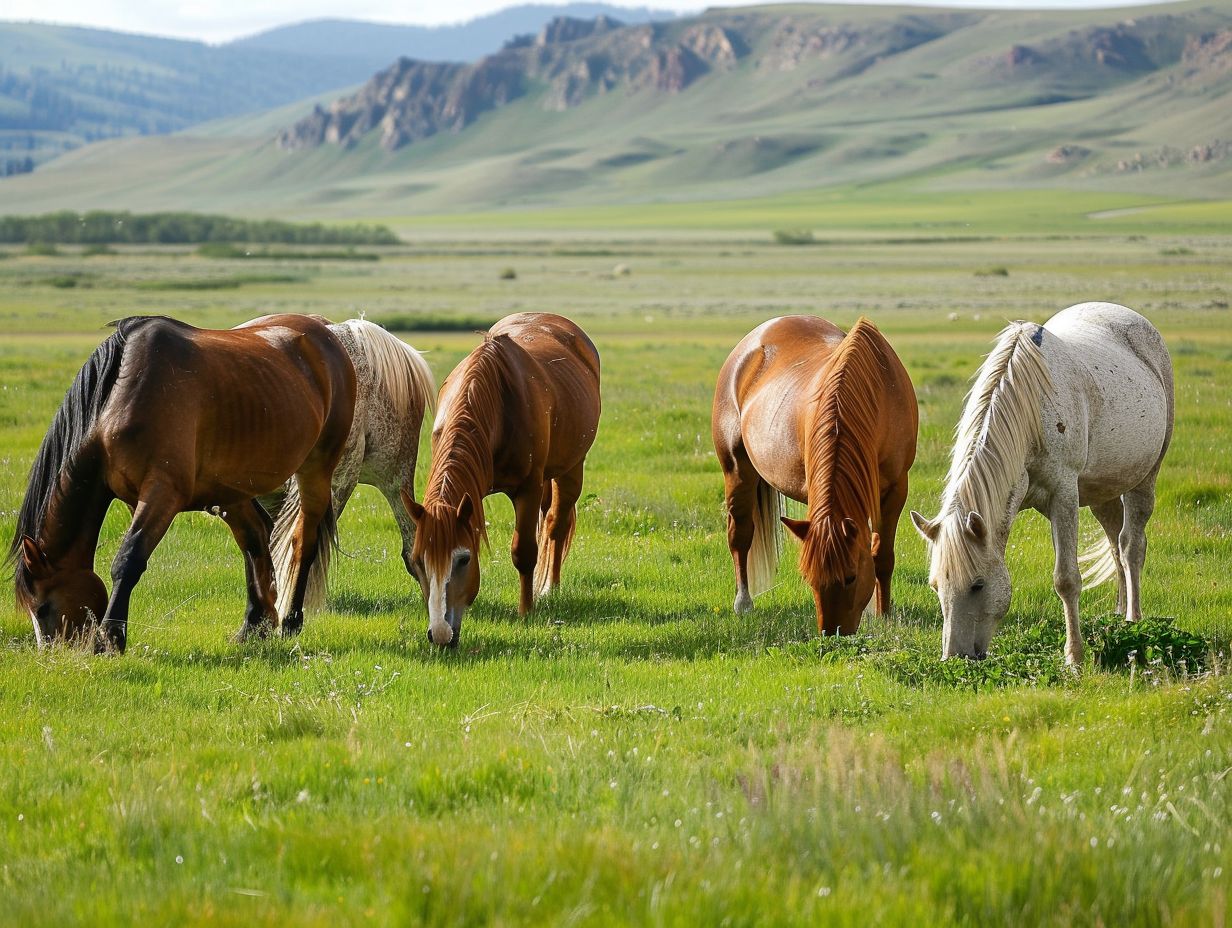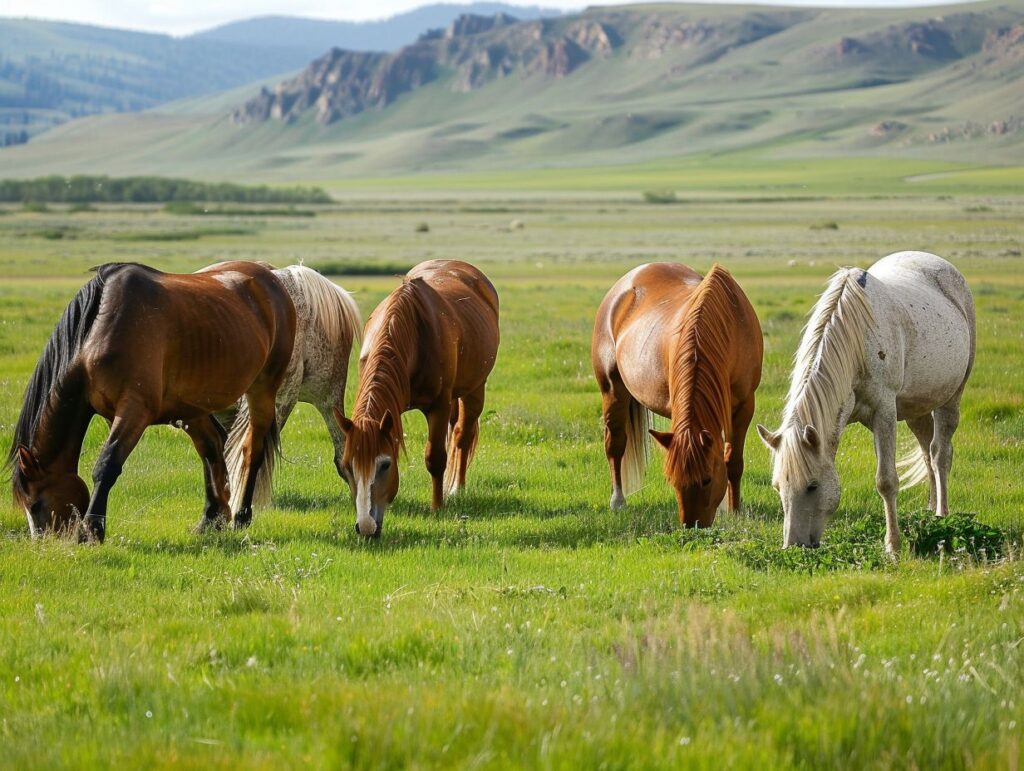Zinc is a critical element in the diet of horses, playing a significant role in their overall health and well-being. Understanding the importance of zinc in equine nutrition is essential for every horse owner.
You should be aware of the signs of zinc deficiency in horses and the potential consequences of excessive zinc intake. It is important to consider proper zinc supplementation, recommended dosage, and forms, as well as monitoring zinc levels in horses.
It is crucial to understand how zinc influences the health and performance of your equine companion. Additionally, you should consider other factors, such as potential interactions with other nutrients.
Understanding Zinc in Horses

Understanding Zinc in Horses is essential for maintaining their overall health and well-being. Zinc plays a critical role in the equine diet and nutrition, impacting various aspects of their health.
It is important to recognize that zinc is not only necessary for the proper functioning of the immune system in horses but also plays a significant role in maintaining a healthy digestive system. Zinc is vital for supporting hoof health as it facilitates the production of keratin, the protein that comprises the hoof.
While zinc offers benefits in appropriate quantities, it is crucial to be mindful of zinc toxicity, which can result in severe health complications in horses. Hence, ensuring a balanced intake of zinc in their diet is imperative for optimal equine nutrition.
Importance of Zinc in Equine Nutrition
Zinc is an essential mineral in equine nutrition, crucial for maintaining the health and well-being of horses. It plays a key role in various bodily functions and processes.
This important mineral is involved in multiple metabolic pathways within the equine body, contributing significantly to the overall health and performance of horses. Zinc is a vital component for proper enzymatic functions and plays a crucial role in supporting a healthy immune system, helping with the horse’s ability to fight off infections and diseases.
Zinc aids in promoting proper digestion, ensuring that the horse can effectively absorb essential nutrients from its diet. Zinc is essential for maintaining healthy hoof tissue and can help prevent common hoof issues that can affect a horse’s soundness and performance.
Insufficient zinc intake can lead to various health problems in horses, including impaired growth, skin issues, and weakened immune responses due to compromised immune function. On the contrary, excessive zinc consumption can result in toxicity, causing symptoms such as gastrointestinal upset, lameness, and even organ damage.
Therefore, it is crucial for horse owners and caretakers to carefully balance and monitor the zinc levels in their horse’s diet to ensure optimal health and well-being.
Signs of Zinc Deficiency in Horses
Recognizing the signs of zinc deficiency in horses is crucial for ensuring their optimal health. Zinc deficiency can present through various physical and behavioral indicators.
One common physical sign of zinc deficiency in horses is a dull and rough coat, which may seem dry and lackluster. Horses with insufficient zinc levels may also demonstrate slow hoof growth and poor quality hooves.
Behaviorally, horses lacking in zinc may exhibit signs of lethargy, irritability, and a reduced appetite. It is important not to overlook these indicators, as zinc is vital for numerous bodily functions that are essential for overall health and performance.
Addressing any deficiencies through proper supplementation and adjustments in the diet is key to maintaining a healthy and thriving horse.
Physical and Behavioral Indicators
When assessing zinc deficiency in horses, it is important to observe physical and behavioral indicators. These signs can vary from subtle changes in appearance to modifications in behavior.
A dull, rough coat texture, accompanied by possible hair loss or delayed shedding, is a visible indication of zinc deficiency in horses. Additionally, dry, flaky skin or the presence of skin lesions may suggest a lack of this vital mineral in their diet. Changes in behavior such as irritability, aggression, or a decrease in appetite could also be associated with zinc deficiency.
Regular monitoring of a horse’s physical condition and behavior is crucial for promptly identifying and addressing any deficiencies, thereby ensuring their overall health and well-being.
Possible Consequences of Excessive Zinc Intake

Understanding the possible consequences of excessive zinc intake in horses is crucial to safeguarding their health and well-being. Zinc toxicity can have detrimental effects on various aspects of a horse’s physiology.
Symptoms of zinc toxicity in horses can manifest as gastrointestinal issues such as colic, diarrhea, and decreased appetite. Excessive zinc levels can lead to compromised immune function, affecting the horse’s ability to fight off infections and recover from injuries. In severe cases, horses may exhibit signs of lameness, hair loss, and even organ damage. Monitoring zinc intake and ensuring a well-balanced diet are essential to prevent these risks and maintain optimal health and performance in horses.
Impact on Horse Health and Performance
Excessive zinc intake can have a significant impact on horse health and performance, leading to adverse effects on various physiological systems. It is important for you to understand how zinc toxicity can affect horses.
Zinc toxicity in horses can present itself through a variety of symptoms, such as decreased appetite, lethargy, and potential organ damage. The immune system is particularly susceptible to zinc imbalances, as an excessive intake can suppress immune function and make the horse more vulnerable to infections. Digestive system disruptions may occur, resulting in issues like colic and diarrhea. These imbalances can also disrupt the overall mineral balance in the body, affecting the absorption and utilization of other essential nutrients.
Proper supplementation and precise dosage management are crucial for preventing the negative repercussions of excessive zinc intake in horses.
Proper Zinc Supplementation for Horses
Ensuring that proper zinc supplementation is provided for your horses is crucial for maintaining their health and well-being. The correct dosage and appropriate forms of zinc are vital for effective supplementation.
It should be noted that the recommended dosage of zinc supplementation for horses may vary based on factors such as age, weight, and overall health condition. Typically, zinc is administered to horses through oral supplements, which are available in various forms like zinc oxide or zinc sulfate. The absorption and metabolism of zinc in horses significantly impact their zinc requirements.
It is highly recommended to seek guidance from a veterinarian to determine the suitable dosage for your horse. Various factors such as diet, stress levels, and environmental conditions can affect zinc absorption, making professional advice essential for proper supplementation.
Recommended Dosage and Forms
When determining the recommended dosage and forms of zinc supplementation for horses, it is important to consider individual needs and conditions. Consulting a veterinarian is essential in order to establish the appropriate dosage and form for effective supplementation.
Factors such as the age, weight, and overall health of the horse are critical in determining the correct zinc supplementation plan. Younger horses may necessitate different dosages compared to older horses, and the absorption rate of zinc in the body can be influenced by weight. Horses with specific health conditions, like skin issues or reproductive problems, may derive benefits from customized zinc supplementation plans to address their unique requirements. Monitoring the horse’s response to the supplementation and making adjustments accordingly are crucial to ensure optimal health benefits.
Monitoring Zinc Levels in Horses

Regular monitoring of zinc levels in horses is essential to ensure their health and well-being. It allows for adjustments in supplementation and diet to maintain optimal zinc levels.
By regularly testing zinc levels, horse owners and caretakers can effectively identify any deficiencies or excesses that may be present. These imbalances can have significant implications for the horse’s overall health, affecting everything from immune function to skin and coat condition. Understanding the horse’s zinc status through monitoring enables informed decisions on supplementation and dietary adjustments to prevent potential health issues.
Ensuring adequate zinc levels in horses is crucial for supporting growth, reproduction, and overall performance.
Testing and Adjusting Supplementation as Needed
Testing and adjusting zinc supplementation for horses as needed is crucial for maintaining optimal zinc levels and preventing deficiencies or toxicity. Regular testing allows for proactive adjustments in supplementation plans.
By monitoring zinc levels regularly, you can catch any fluctuations in zinc levels early on, which is vital for the overall health and well-being of the animals. Detecting zinc deficiencies or excesses in a timely manner through testing helps in making necessary adjustments to the diet or supplements given to the horses. This proactive approach ensures that the horses receive the right amount of zinc, which plays a significant role in various bodily functions, including immune system support, wound healing, and hoof health.
Other Factors to Consider
When maintaining optimal equine nutrition, it is important to consider factors beyond just zinc levels. An imbalance in minerals can present risks to the health and well-being of horses.
Minerals such as calcium, phosphorus, magnesium, and copper are crucial in various physiological functions within a horse’s body. Calcium, for instance, is necessary for bone formation, while phosphorus is essential for energy metabolism. Magnesium supports muscle function, and copper is vital for proper coat and hoof health.
If these minerals are not balanced correctly, issues like bone abnormalities, muscle weakness, and poor coat condition can develop. Therefore, taking a holistic approach to equine nutrition and considering the overall mineral profile of the diet is essential for ensuring optimal health and performance in horses.
Potential Interactions with Other Nutrients
Understanding the potential interactions between zinc and other nutrients is essential for maintaining a balanced equine diet and preventing mineral imbalances. The interplay of various nutrients can have a significant impact on horse health.
Zinc, in particular, plays a crucial role in enzyme function, immune system health, and overall metabolism in horses. When zinc levels are not properly balanced with other essential minerals like copper, iron, and calcium, it can result in deficiencies or toxicities that can substantially affect the horse’s wellbeing.
An imbalance between zinc and copper, for example, could lead to reduced coat quality or compromised immune function. To mitigate these risks, horse owners should prioritize providing a diverse diet that incorporates a range of forages, grains, and supplements to ensure adequate mineral intake.
Frequently Asked Questions

Can Horses have too much zinc?
Yes, horses can have too much zinc in their diet.
What happens if a horse consumes too much zinc?
Excessive zinc intake can lead to zinc toxicity, which can cause digestive issues, anemia, and even organ damage in horses.
What are the symptoms of zinc toxicity in horses?
Symptoms of zinc toxicity in horses include diarrhea, lethargy, weak pulse, and jaundice.
How much zinc is considered too much for horses?
The daily recommended intake for horses is 400 mg of zinc per day. Anything above that amount can be considered excessive and potentially harmful.
What are some common sources of zinc in a horse’s diet?
Zinc can be found in many types of horse feed, including grains, legumes, and supplements. It can also be present in water sources and in the soil where horses graze.
How can I ensure my horse is getting the right amount of zinc?
Consult with a veterinarian or equine nutritionist to determine the best diet and supplement plan for your horse. Regular blood tests can also help monitor zinc levels in your horse’s body.


